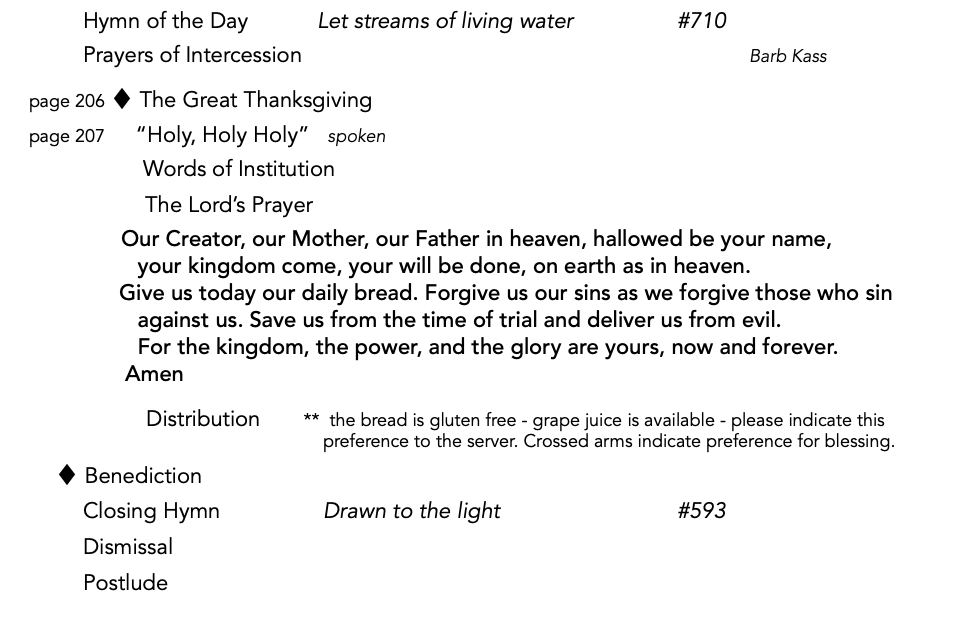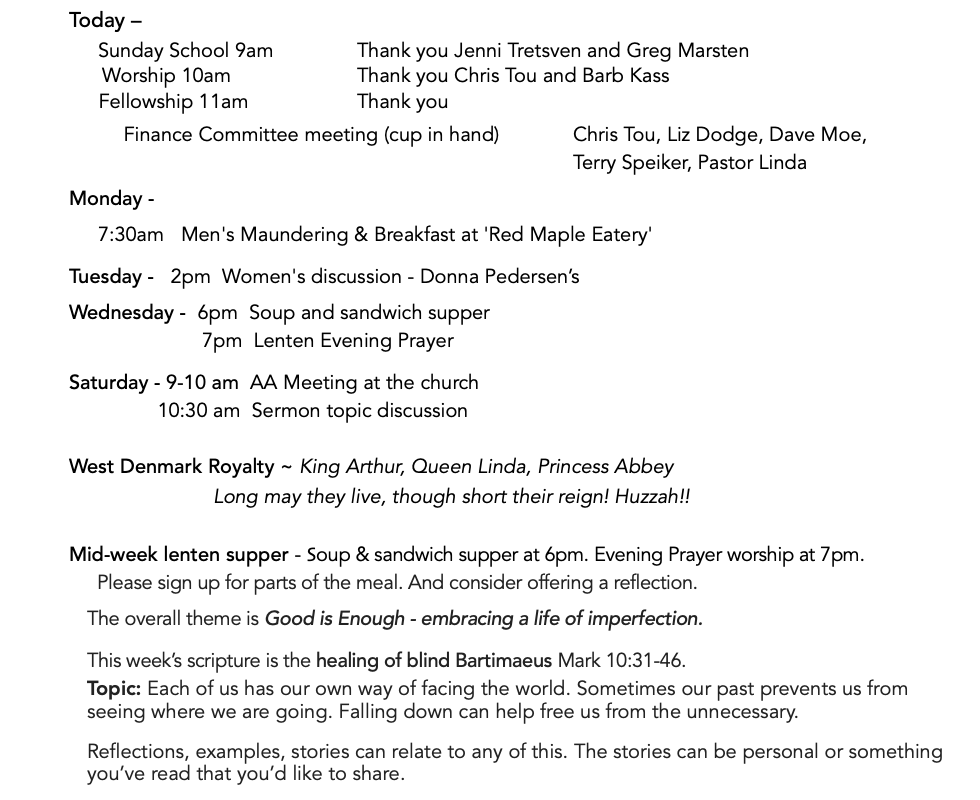Audio Recording
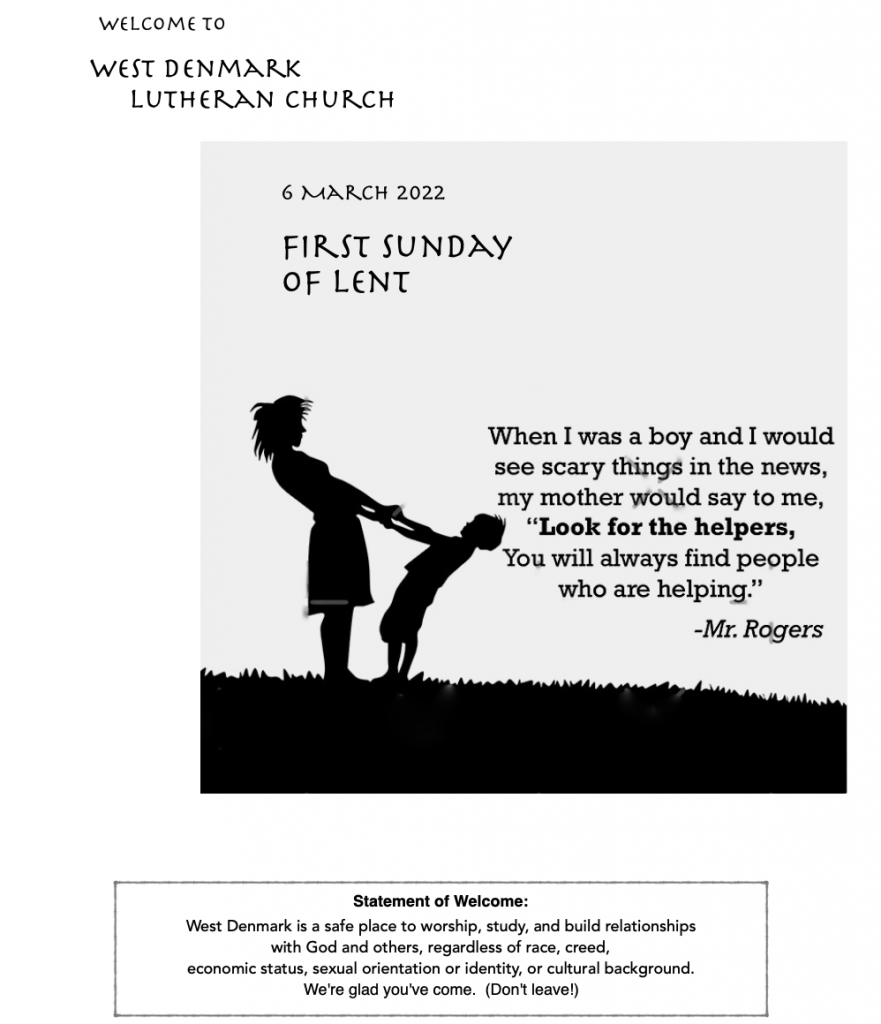
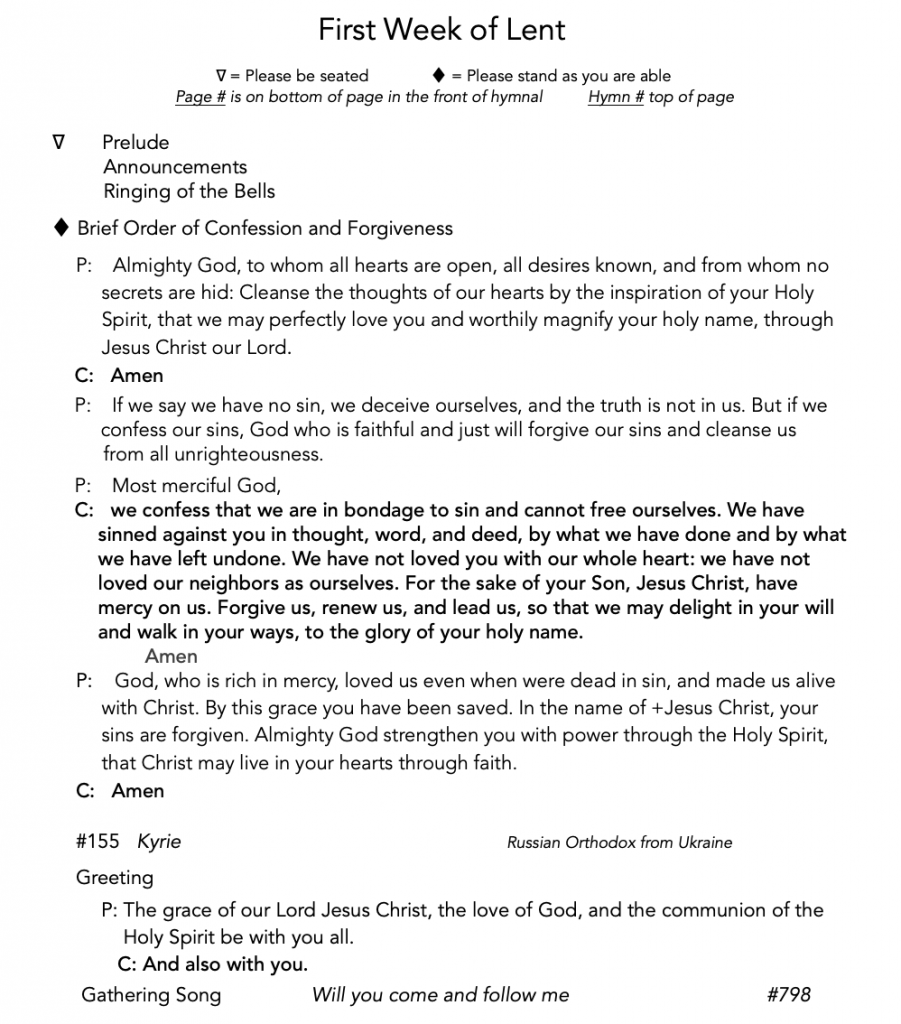
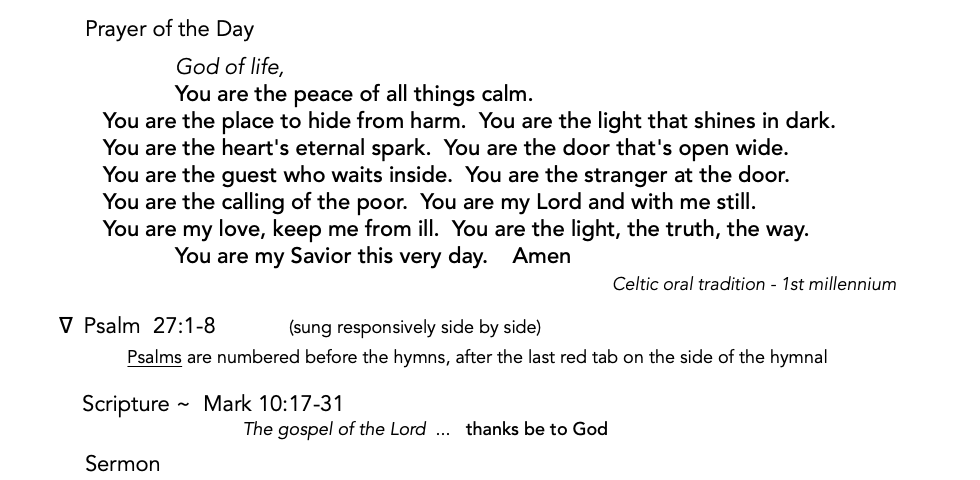
Mark 10:17-52
On Wednesday we heard of a man who ran up and knelt before Jesus asking him, ‘Good Teacher, what must I do to inherit eternal life?’ Jesus referred him to the commandments: “You shall not murder; You shall not commit adultery; You shall not steal; You shall not bear false witness; You shall not defraud; Honor your father and mother.” ’ The man said, ‘Teacher, I have kept all these since my youth.’ And Jesus, looking at him, loved him and said, ‘You lack one thing; go, sell what you own, and give the money to the poor, and you will have treasure in heaven; then come, follow me.’ But when he heard this, the fellow was shocked and went away grieving, for he had many possessions.
Jesus then tells his disciples, ‘How hard it is to enter the kingdom of God! 25It is easier for a camel to go through the eye of a needle than for someone who is rich to enter the kingdom of God.’ 26They were greatly astounded and said to one another, ‘Then who can be saved?’ 27Jesus said, ‘For mortals it is impossible, but not for God; for God all things are possible.’
28 Peter began to say to him, ‘Look, we have left everything and followed you.’ 29Jesus said, ‘Truly I tell you, there is no one who has left house or brothers or sisters or mother or father or children or fields, for my sake and for the sake of the good news, 30who will not receive a hundredfold now in this age—houses, brothers and sisters, mothers and children, and fields, with persecutions—and in the age to come eternal life. 31But many who are first will be last, and the last will be first.’
32 They were on the road, going up to Jerusalem, and Jesus was walking ahead of them; they were amazed, and those who followed were afraid. He took the twelve aside again and began to tell them what was to happen to him, 33saying, ‘See, we are going up to Jerusalem, and the Son of Man will be handed over to the chief priests and the scribes, and they will condemn him to death; then they will hand him over to the Gentiles; 34they will mock him, and spit upon him, and flog him, and kill him; and after three days he will rise again.’
35 James and John, the sons of Zebedee, came forward to him and said to him, ‘Teacher, we want you to do for us whatever we ask of you.’ 36And he said to them, ‘What is it you want me to do for you?’ 37And they said to him, ‘Grant us to sit, one at your right hand and one at your left, in your glory.’ 38But Jesus said to them, ‘You do not know what you are asking. Are you able to drink the cup that I drink, or be baptized with the baptism that I am baptized with?’ 39They replied, ‘We are able.’ Then Jesus said to them, ‘The cup that I drink you will drink; and with the baptism with which I am baptized, you will be baptized; 40but to sit at my right hand or at my left is not mine to grant, but it is for those for whom it has been prepared.’
41 When the ten heard this, they began to be angry with James and John. 42So Jesus called them and said to them, ‘You know that among the Gentiles those whom they recognize as their rulers lord it over them, and their great ones are tyrants over them. 43But it is not so among you; but whoever wishes to become great among you must be your servant, 44and whoever wishes to be first among you must be slave of all. 45For the Son of Man came not to be served but to serve, and to give his life a ransom for many.’
Jesus has turned the corner and is heading to Jerusalem and toward the cross. He is with his disciples, but he is way out ahead of them. Jesus knows what he is heading for, understands the implications of his actions, and they are in denial, (as we would say). In the gospel of John, Jesus says, “I go to prepare a place for you, so that where I am there you may be also.” We hear that mostly at funerals when we’re likely to have heavenly mansions in mind, but as he implies here, he is also referring to the way of suffering. He goes to prepare a place in the midst of injustice and trial and death. It’s a hard word.
Some of those who follow him are amazed at what he says; others are afraid. We can only imagine what they must be thinking and feeling as they work to understand his words, the death that Jesus is leading them toward. To be handed over? Passively? To deny one’s self? What does that mean? To deny what about oneself, or for oneself? And to what purpose? To put others first out of kindness, mercy, to forgive first… yes, but to risk suffering rather than seek security? Why do that? They’ve heard it before – but it doesn’t get any more reasonable with repetition.
Jesus continues to explain the nature of his upside down kingdom as a way of being where power is demonstrated through service, greatness is shown in vulnerability, achievement comes through compassion.
Can you imagine, for just a moment, what the world would be like if our leaders behaved like this – vying with each other to see who could best serve the needs of the vulnerable? Outdoing one another in service to the children of the future?
And what if we lived like this – measuring our wealth not in terms of possessions or our “net worth”, but rather in terms of behavior – a wealth of compassion, wealth of self-giving? It’s not that unusual among those who have little, but for those with wealth, it’s another world.
Jesus says he gives his life as ransom – the payment necessary to buy a slave back into freedom.
He has shown us that in God’s kingdom money is a means to help others, that greatness comes through service, and that those who are most deserving of God’s grace are those who are in most need. The last being first.
And it is for the sake of this kingdom, this world order (or disorder) that he will give himself.
Mark’s Gospel emphasizes that Jesus’ rejection and death are inevitable and required because of who he is, because of the boundary-breaking nature of his ministry, because those who wield power in the world will do anything necessary to protect themselves and their prerogatives from that radical equalization or reversal of privilege.
Giving his life as ransom also means that his death will be more than just a martyr’s protest against an unjust system. The word indicates that his death does something; it provides release, like the scapegoat sent out into the wilderness.
So, through Jesus’ death we are saved – in Mark’s gospel’s understanding – not cosmically from our personal sin, but with implications for how we live in the world; we’re saved from the power of human sin, by the spirit of God giving us the power to act against our self-interest for the sake of others. I think. It’s very hard for us to hear/read the gospels without the overlay of hundreds and hundreds of years of patriarchy and dominant culture. We have been taught that the kingdom of God is for later, some other dimension that we aspire to, or look forward to, that will be puffy clouds and sunny days. That will be Norm walking into Cheers.
But that wasn’t the reality of the gospels. There would be no reason for Jesus to die for that. His teaching had real world, here and now implications for how followers of his way are to live in this world for the sake of others.
Jesus corrects James and John’s vision of glory by holding up the example of Roman rule. Those leaders overpower and tyrannize others. They rely on coercion and control to maintain their dominance and lifestyles and privileges. We’ve seen what happened to John the Baptist when he crossed Herodias. Herod had to save face for a rash, drunken boast he made. His self-interest and self-protection trumped any justice or the value of a man’s life. Jesus’ trial will echo that same strong-armed political theater.
Jesus’ teaching and death delivers us, by example, from the social and political power that human self-interest and ego and hubris devises to control others. And, according to the wider sweep of Mark’s Gospel, it delivers us from demonic powers that enslave the world and resist God’s purposes. In the resurrection, God defeats the power of death itself.
I asked earlier if we could imagine our leaders acting this way. We have a remarkable example in the news. Russia’s president Putin is a perfect specimen of leadership among the powers and principalities in opposition to a life of service, compassion, humility and justice. At least in the ways this war is portrayed in our news, his ego alone is responsible for the death of thousands of his own governed people, as well as the innocent lives of those in Ukraine. He’s perhaps gotten caught by his bravado, but, for fear of losing face, will not back down, putting nuclear power plants and weapons on the table that will ruin is own lands in the process of whatever victory he may claim. Turning back is not an option once he’s gone this far.
On the other hand, Ukraine president Zelenskyy refused a ride to safety and instead took his place among the soldiers and common people and grandmothers defending their country, ready to give his life as a ransom against Putin’s tyranny.
I want to read parts of his inauguration speech from May 20, 2019. Remember that they have been in an ongoing war with Russia over sections of Ukraine.
“Starting today, every one of us bears responsibility for Ukraine, which we will leave to our children. Each of us, in our own places, can do something for the development of Ukraine. This is our shared dream. But we have shared pains, too. Each of us has died in the Donbas. Every day we lose one of us. And each of us is internally displaced; those who lost their own homes and those who, in turn, opened the doors of their homes, are sharing this pain.
And each of us is a migrant worker. Those who didn’t manage to find their place at home but found earnings in a foreign country. Those who, fighting poverty, had to lose their dignity.
But we will overcome all of this, for each one of us is a Ukrainian. And today I address all the Ukrainians in the world. There are 65 million of us who have the Ukrainian roots. I address every Ukrainian on the planet. We need you very much!
You should come to Ukraine as if you are coming home — not visiting as a guest. We are waiting for you. Don’t bring souvenirs from abroad, bring us your knowledge, experience, and values. All of this will help us start a new epoch.
Skeptics will say, “It’s a fantasy. It’s impossible.” But maybe this is just our national idea: to unite and do something that’s impossible, in spite of everything. …
I was asked very often what exactly I am ready to do to stop the war. It’s a strange question. What are you ready to do, Ukrainians, for the lives of your relatives? What?
I assure you, for our heroes to stop dying, I am ready to do everything. I am certainly not afraid of difficult decisions, I am ready to lose my popularity, my ratings, and — if need be — I am ready to lose this post without hesitation in order to bring peace.
(How many of our leaders would be willing to lose their post for the sake of anything?)
I don’t understand our government, which is just throwing up its hands, saying, “We can do nothing.” It’s not true, you can. You can take a sheet of paper, a pen, and free up places for those who think about the next generations — not just about the next parliamentary election.
I think that people will appreciate that.
My election proves: people are tired of experienced, systemic, inflated politicians, who for 28 years have created a country of opportunities… opportunities for kickbacks, money flows, corruption.
We will build a country of other opportunities, where everyone is equal before the law, where there’s a level playing field. But before that, people who will serve the nation should come to power.
I would very much like for you to not have my portrait in your offices. No portraits! A president is not an icon, nor an idol. A president is not a portrait. Put photographs of your children there, instead. And before making any decision, look them in the eyes.
Dear nation, all my life, I did all I could to make Ukrainians smile. I felt that it wasn’t just my job, it was my mission. In the next five years, I will be doing everything, Ukrainians, for you not to cry.”
Servant leadership? It sounds like it. Another point that seems important; President Zelenskyy is Jewish. Servant leadership is not a Christian category. It is the way of the kingdom of God and can be seen in whoever lives the values of divine mercy and compassion. Baptism into Christ doesn’t give us special status, if anything, it gives us fewer excuses.
Holy One, let us perceive the impossible possibility that you love us, have saved and restored us, and invite now us to be a follower of your blessed and difficult way. Amen
